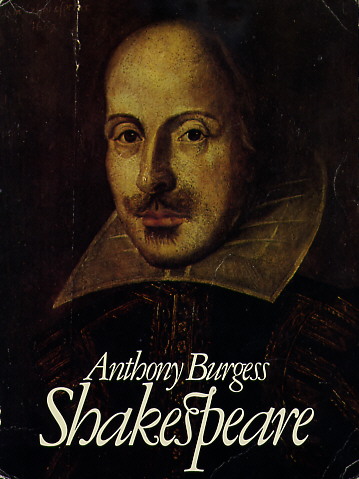Shakespeare as Actor
by Anthony Burgess
Shakespeare as Actorby Anthony Burgess |

|
There is also
Will Shakespeare, who is making up for the Ghost. At thirty‑seven he is grey
enough; he needs but little art on his receding hair and his beard. (...)
He has put much
of himself into his tragedy, but he did not choose to write it. Burbage came
across that old Hamlet of Tom Kyd in the play‑trunk and suggested that, since
revenge tragedy had become popular again, it might be a good plan to do
something sophisticated and modern with the old tale of the Danish prince
who feigned madness to encompass revenge of a murdered king and father. (...)
Most of the actors are mouthing their lines. (...)
Music. Trumpets.
The flag flies from the high tower. The play begins. On the tarrass or gallery
a nervous officer of the watch: there have been nervous officers enough during
the Essex troubles. All these Danes have Roman names, Italianate
anyway: the groundlings cannot conceive of a tragedy without hot Southern
blood in it. Francisco, Horatio,
Marcellus, Bernardo. It is broad daylight
and the autumn sun is warm, but words quickly paint the time of night and
the intense northern cold. Eerie talk of a ghost, Horatio sceptical in the
modern manner. Then the Ghost appears, Will Shakespeare, the creator of all
these words but himself, as yet, speaking no words. (...)
Denmark is, for
the moment, England; the audience still remembers that Christmas earthquake.
Backstage, Armin does a skilful cockcrow. The Ghost glides off. While Horatio
and the soldiers finish their scene on the tarrass, the main stage below
fills up with the court of Denmark.
Trumpets and drums
for Claudius, the boy Gertrude beside him. (...)
Now the tarrass
again, and the air biting shrewdly, a nipping and an eager air. Hamlet, censuring
the Danes for their drunkenness, is in danger of becoming dull. Good, the
attention of the groundlings is wandering, there are some coughs. Now into
that dullness the Ghost thrusts himself again, and the growing inattention
is jolted awake. The Ghost beckons Hamlet away, which means that both leave
the tarrass and take the stairway quickly,
re‑entering on the main stage below. The five lines shared by Horatio and
Marcellus are just enough to cover their passage. So this great speech of
the Ghost can be made in the main acting area. The bookholder is ready to
prompt, for Will is not always reliable, not even with the lines he has himself
written. And now the Ghost's morning dissolution: no cockcrow this time,
since an effect is diminished by repetition. The gallants from the Inns of
Court, on their stools left and right of the stage, are already writing down
odd lines on their tablets: they will quote them that evening at supper.
from Anthony Burgess,
Shakespeare (1970)